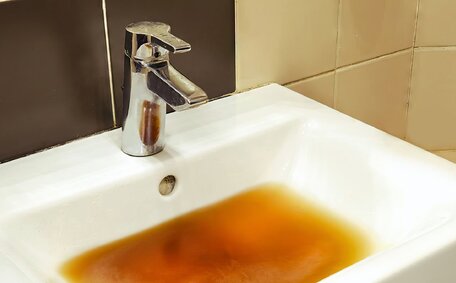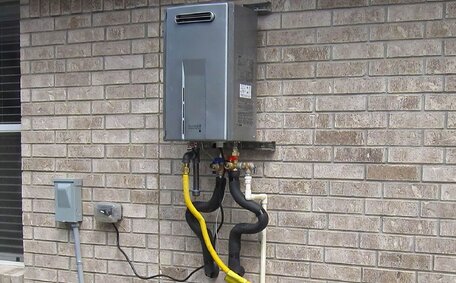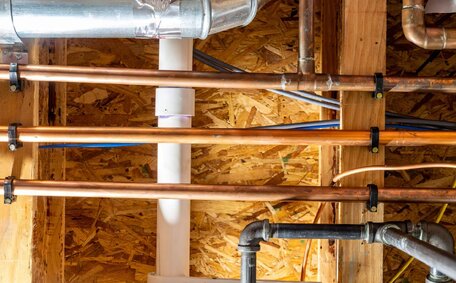Understanding Chemical Drain Cleaners
Liquid drain cleaners are designed to tackle blockages and obstructions in your pipes. Chemical drain cleaners contain strong substances such as sulfuric acid and sodium hydroxide, which dissolve common clog substances like hair and grease.
There are a few main types of chemical drain cleaners:
- Caustic cleaners using sodium hydroxide to clear blockages
- Oxidising cleaners with bleach or peroxide target organic material in your drain
- Acidic cleaners with muriatic acid or sulphuric acid to eat away at debris
While convenient, the careless use of aggressive chemical drain cleaning solutions can lead to significant damage to plumbing systems and the environment. Understanding the function of chemical drain cleaners reveals their potential to erode pipes, release toxic fumes, and jeopardize plumbing integrity if misused.
Potential Dangers to Health and Plumbing
Chemical drain cleaners can pose significant health concerns and potentially damage plumbing if used improperly. The strong ingredients in these cleaners can harm your skin and eyes, necessitating immediate poison control measures upon contact. The fumes released can also irritate lungs and airways when used in your drains.
Repeated use of harsh chemicals can progressively damage pipes, leading to costly repairs and downtime. They cause chemical reactions that can exacerbate the corrosion of metal pipes and fittings, potentially leading to leaks or blockages. Chemical interactions can release gases such as hydrogen sulphide that can compromise the integrity of your pipes.
For instance, sulfuric acid or sodium hydroxide found in these products can harm:
- PVC pipes and joints by dissolving the glues and softening the plastic
- Vitreous china fixtures like your sink and toilet by etching the enamel coating
- Metal pipes by corroding and thinning them over time
The impact on the septic system and broader environment is also a significant issue. When these toxic chemicals are washed down drains, they can disturb local ecosystems and pose health risks.
In light of these risks, it’s crucial to practice safe usage when handling chemical drain cleaners, taking great care to avoid incidents. Using safety equipment like gloves and goggles is essential, as they are equally crucial as the cleaning agents themselves. Experts recommend using methods like mechanical drain snakes or plungers, which are drain cleaners safe for regular use.
Environmental Impact
Drain cleaners that contain harsh chemicals and are washed away can have major consequences for the environment.
When used irresponsibly, products containing bleach or hydrochloric acid can reduce oxygen levels in streams, harming fish and plant life. Meanwhile, cleaners with high pH levels create imbalances in freshwater areas. Exposure to these chemicals can damage wildlife’s respiratory systems, and cause infertility and birth defects.
These chemicals not only flow away but also gradually accumulate in soil and groundwater, affecting the cleanliness and flow of water in our environment. Such contamination compromises home environmental safety and presents health risks.
To avoid these consequences, physical drain cleaning methods like plungers and drain snakes are recommended as sustainable alternatives. Natural solutions like enzymatic cleaners are eco-friendlier and a wise choice to turn drain cleaners towards, avoiding the potential harm harsh chemical alternatives may cause when washed down drains.
Alternatives for Unclogging Drains
There are several safer and eco-friendly cleaners available as alternatives to chemical drain cleaners for unclogging drains, including:
- Boiling Water: Boiling water poured down the drain can effectively eliminate grease and clear pathways, especially against stubborn clogs. The heat also helps dislodge debris, where clogs can cause standing water in your sink or tub.
- Baking Soda Vinegar Solution: Combining baking soda and vinegar mixture - a half cup of baking soda with a cup of vinegar - can create a formidable reaction that can break up buildup in clogged drains. Consider the effectiveness of letting the mixture sit for 5-10 minutes before carefully rinsing with boiling water.
- Plunger: A forceful plunge helps clear out your stubborn shower, sink, or tub drains. Cover overflow holes fully when plunging.
- Drain Snake: Feed the coil down the drain and twist/pull to hook and remove obstructions like hair and tree roots. Useful for persistent soap scum or hair clogs.
- Enzymatic Cleaners: These natural cleaners use bacteria to break down organic matter over 1-2 days. Simply pour down, let sit, and then it works effectively before you need to rinse.
These methods avoid the use of corrosive chemicals that can compromise drain pipes or pollute waterways over time. Although they might not dissolve clogs as swiftly, alternatives like baking soda and vinegar are safer and more eco-friendly.
Safe Use of Chemical Drain Cleaners
If you choose to use chemical drain cleaners, it’s imperative to take safety precautions. Keep your understanding clear by thoroughly reading packaging warnings and directions before use. Wear protective equipment like rubber gloves, goggles, and masks to avoid exposure.
Ensure you work in a well-ventilated area and refrain from mixing different chemical drain cleaners, which can produce toxic fumes. Ensure that all chemical drain cleaners are securely sealed and stored away, beyond the reach of children pets, and unintended contact.
When using chemical cleaners, pour them carefully into your plumbing system to avoid splashing and use only the recommended amount, allowing it to work for 5-10 minutes before rinsing with hot water. Adding excess water too rapidly can cause a hazardous splashback of chemicals.
Do not use a plunger or mechanical drain cleaner after applying a chemical cleaner to prevent splashing the hazardous substance. Thoroughly rinsing all traces of the cleaner away before using the drain again is vital to avoid exposure.
Owing to the risks they involve, chemical drain cleaners should not be the first choice for addressing clogged drains. But when used sparingly and safely, they can provide an effective solution.
Knowing When to Call a Professional
There are certain scenarios where the use of chemical drain cleaners is not advised and it’s best to call in a professional plumber instead:
- If drain clogs are severe or persistent, you might have to call professional drain servicing to fully clear the blockage and assess potential pipe damage.
- If you have previously tried chemical drain cleaners without success, a different mechanical approach by a plumber may be required.
- If overflow occurs when using drain cleaners or new clogs appear shortly after, there may be a larger issue needing professional diagnosis.
- Avoid costly repairs by promptly calling a professional if you notice leaks, cracks, or other pipe damage that could lead to clogs after using chemical drain cleaners.
Reach out to Vaucluse Plumbing today for dependable service that aligns with your home improvement projects and meets your drain-clearing needs in Sydney’s Vaucluse area. With extensive experience in blocked drains, our team of fully licenced plumbers offer:
- Thorough drain assessments and clearing using state-of-the-art equipment
- Pipe condition checks and early leak detection services
- Advice on drain maintenance and ways to avoid blockages
- Safe disposal practises to minimise environmental impact
Contact Vaucluse Plumbing on 1300 349 338 or at [email protected] to unclog drains without harming your pipes.
Our Drain Cleaning and Plumbing Services
At Vaucluse Plumbing, we offer a comprehensive range of drain cleaning and plumbing services to homes and businesses across Vaucluse, Sydney.
Our experienced plumbers are highly trained to resolve blockages and repair leaks in a range of plumbing systems. We use state-of-the-art equipment and advanced techniques to provide guaranteed results without harming your pipes.
Emergency Plumbing Services
Our 24/7 emergency plumbing service promptly addresses urgent issues such as burst pipes, overflowing toilets, gas leaks, and hot water system failures. Our average emergency response time is under 30 minutes.
Blocked Drains
Our skilled team efficiently clears minor to serious blockages in pipes, sewer lines, and maintains septic tank systems. We use specialised jet drain machines and advanced CCTV drain inspections when required.
General Leaks and Taps
Our team can handle any leak or tap issue, regardless of its size. We skillfully repair leaks in pipes, taps, toilets, water heaters, and replace parts like washers, o-rings, valves, and mixers.
Contact Vaucluse Plumbing at 1300 349 338 or [email protected] for plumbing services that prioritize safety, eco-friendliness, and guarantee satisfaction.






